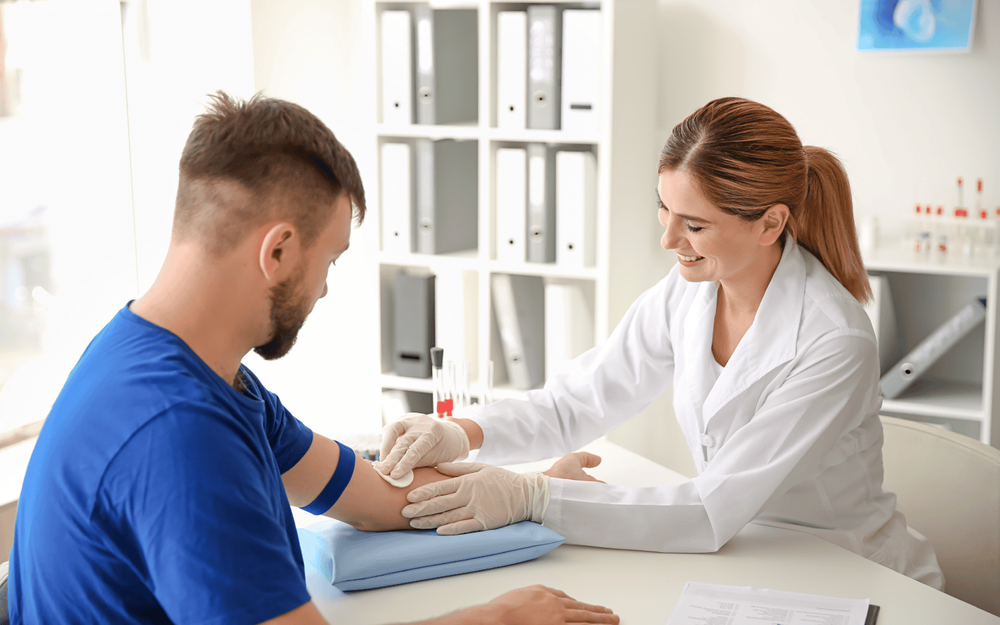
Do Men Have Oestrogen?
Oestrogen is commonly known as a female hormone, but what many people don’t realise is that it also plays a key role in men’s health. While it’s true that women have significantly higher levels of oestrogen, men still produce and rely on this hormone for a variety of essential bodily functions.
In this guide, we’ll explore the role of oestrogen in men, look at what happens when levels become imbalanced and explain how you can check your hormone health with a Male Hormone Profile.
What is oestrogen?
Oestrogen is a group of hormones best known for their role in female development and reproduction. But there’s more to it than that. There are three main types:
-
Estrone (E1) – mainly found after menopause
-
Estradiol (E2) – the most common type during a woman’s reproductive years
-
Estriol (E3) – mainly produced during pregnancy
While it’s often seen as a “female hormone,” oestrogen also plays an important role in men’s health, from supporting bone strength to helping regulate mood and brain function.
Do men produce oestrogen?
Yes, men do produce oestrogen, just in much smaller amounts than women. In fact, it’s made from testosterone through a natural process that happens in different parts of the body, like the liver, brain and fat tissue.
Although oestrogen levels are lower in men, they still play an important role in their overall health. Having the right balance between testosterone and oestrogen supports things like bone strength, brain function and reproductive health.
Why is oestrogen important for men?
Oestrogen supports a range of functions in the male body, including:
-
Bone health: Oestrogen plays a significant role in maintaining bone density. Men with low oestrogen levels are at increased risk of developing osteoporosis and fractures, particularly as they age.
-
Sexual function and fertility: While testosterone tends to dominate discussions around male sexual health, oestrogen is also involved in regulating libido, erectile function and sperm production. Abnormally low or high oestrogen levels can impact fertility.
-
Brain and cognitive function: Oestrogen receptors are found in the brain and help regulate mood, memory and cognitive abilities. Imbalanced hormone levels may be linked to cognitive decline and mood disorders.
-
Heart health: Some research suggests that oestrogen may support cardiovascular health in men by helping to regulate cholesterol levels and blood vessel function.
What causes high oestrogen in men?
Elevated oestrogen in men is usually the result of an imbalance between testosterone and oestrogen. Causes may include:
-
Obesity – Fat tissue contains aromatase, which converts testosterone to oestrogen. The more body fat, the more oestrogen can be produced.
-
Chronic stress – High cortisol levels may interfere with hormone production and lead to imbalances.
-
Liver disease – The liver helps metabolise hormones. Poor liver function can lead to excess oestrogen in the body.
-
Certain medications – Such as anabolic steroids, anti-fungal drugs and some heart medications.
-
Tumors – Rarely, hormone-secreting tumors can lead to increased oestrogen levels.
Symptoms of high oestrogen in men
High oestrogen levels in men can cause a range of symptoms, including:
-
Low libido or erectile dysfunction
-
Gynecomastia (enlarged breast tissue)
-
Weight gain, especially around the abdomen
-
Mood swings or increased anxiety
-
Fatigue
-
Infertility
If you're experiencing any of these symptoms, it may be worth investigating your hormone levels with a Male Hormone Profile.
What causes low oestrogen in men?
While high oestrogen tends to be the more common concern, low oestrogen levels can also cause problems. Causes of low oestrogen may include:
-
Age-related hormonal decline – Testosterone and oestrogen levels naturally decline with age
-
Chronic illness – Conditions like diabetes or kidney disease may affect hormone balance
-
Hypogonadism – A condition where the body doesn’t produce enough sex hormones
-
Certain medications – Including some cancer treatments or hormone-blocking therapies
Symptoms of low oestrogen in men
Low oestrogen levels may lead to:
-
Decreased bone density or osteoporosis
-
Poor concentration or memory issues
-
Joint pain
-
Low mood or depression
-
Reduced sexual desire
-
Hot flushes (less common but possible)
Maintaining the right balance between testosterone and oestrogen is crucial to avoid these kinds of symptoms.
How can you check your oestrogen levels?
A simple blood test can tell you whether your oestrogen levels are within a healthy range. At Bluecrest Wellness, our Male Hormone Profile checks several key hormones that affect men’s health, including:
-
Testosterone – both total and free
-
Oestradiol (E2) – the main form of oestrogen in men
-
Sex hormone-binding globulin (SHBG) – which affects how much hormone is available in your body
This test gives you a detailed picture of your hormone balance and can help uncover any imbalances that might be linked to symptoms like low energy, mood changes or reduced libido.
What if your oestrogen levels are imbalanced?
If your test results show a hormone imbalance, your next steps may include:
1. Lifestyle changes
-
Losing excess weight
-
Reducing alcohol intake
-
Exercising regularly
-
Managing stress
2. Medical treatment
Depending on the underlying cause, your doctor may recommend treatments such as:
-
Aromatase inhibitors – to reduce oestrogen production
-
Hormone replacement therapy – in cases of low testosterone and/or oestrogen
-
Treatment of any underlying conditions – such as liver or thyroid issues
Why hormone balance matters
Hormone imbalances don’t always cause obvious symptoms, but they can significantly affect your health and wellbeing over time. That’s why it’s important not to ignore persistent issues like fatigue, low libido, mood changes or unexplained weight gain.
Routine health checks that include hormone testing can help you spot potential problems early and take action before they become more serious.
Check your hormone health with Bluecrest
If you're experiencing symptoms that could be linked to hormone imbalance or simply want to be proactive about your health, consider a Male Hormone Profile with Bluecrest Wellness.
The process is straightforward - a quick blood sample, with results available soon after which you can discuss with your GP. Our clinics are located across the UK, with convenient appointment times to suit your schedule.













